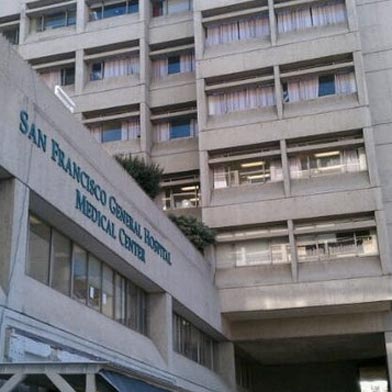
Hospital workers rallied outside the emergency room entrance at San Francisco General Hospital this afternoon demanding the city increase staffing to keep patients safe.
Nurses and other hospital staff picketed outside the emergency entrance on Potrero Avenue and 23rd Street as part of a Service Employees International Union Local 1021 rally, chanting, “What do we want? Staffing!” and “City Hall, you’re no good, respect the workers like you should.”
About 13,000 city employees, including hospital staff, are represented by the union.
According to rally organizers, the city’s Department of Public Health, which oversees operations at SFGH, has not provided enough staff for registered nurses, nursing assistants and other hospital departments for the past year.
Emergency room nurse Dan Merer said the staffing issue has “reached crisis proportions.”
He said his department is down 23 nursing positions, which leaves him and his colleagues doing clerical and other work that slows down the entire emergency system.
“Instead of a culture of safety, we have a culture of chaos,” he said.
He described an emergency room where patients are waiting interminably to be seen by nurses and doctors and beds are not ready for patients.
He said even if those nearly two dozen positions were filled that still would not be enough help.
He called the “skeleton staffing of nurses” unsafe and demoralizing for the nursing team.
Merer, who has been at SFGH for 28 years, said he was surprised that the city is not paying for more positions after patient care incidents occurred, such as Lynne Spalding’s death in October 2013.
The 57-year-old was found dead in a fourth-floor stairwell after ineffective searches and miscommunication about her whereabouts when she walked away from her hospital bed two days after she was admitted for an infection.
Food services supervisor Joe DiMarius said his department of about 100 workers is charged with serving about 300 patients and feeding roughly 1,000 doctors and nurses.
He said his department is feeling the brunt of inadequate staffing with not enough workers to deliver food to patients’ rooms and long lags at meal times.
In the three and a half years he has worked at the hospital, he said he has seen staffing levels decrease and, consequently, the food quality come down.
Brenda Barros, a worker at the hospital’s outpatient medical clinic, said the “workload is getting ridiculous” and that there are “new demands every week.”
She said the workers’ demands are not just about money, but about protecting the patients.
SFGH spokeswoman Rachael Kagan acknowledged that the hospital has staff vacancies, but said the hospital is always making staffing adjustments as necessary and looking to hire more.
She said contract talks are under way.
She said SFGH is the busiest emergency room in the region and serves as the area’s only trauma center.
Staffing levels are based on the population of patients, which changes constantly.
“We want to take care of the patients,” she said.
With the opening of a new hospital building projected for the end of 2015, Kagan said there will be more hiring.
Kagan maintained that staffing was not found to be an issue or have any connection to incidents such as Spalding’s death.
Sasha Lekach, Bay City News









